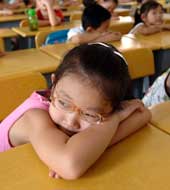 |
| Parental pressure: Many children are seething with rage because they dread falling short of their parents’ expectations. |
There is a scene in John ’Farrell’s comic novel May Contain Nuts in which a pushy London mother, petrified that her daughter might fail the entrance exam to a leading private school, disguises herself as an 11-year-old, complete with baseball cap and stick-on spots, and sits the test on her behalf.
It is a parody of the extremes to which high-earning, high-achieving, parents will go to ensure that their children excel at all things — maths, sport, music — with zero tolerance for error.
But the reality isn’t quite so funny. A book, The Price of Privilege, just published in America by the psychologist Dr Madeline Levine, focuses on this breed of parents who interfere in every aspect of their children’s lives and push them so hard that they leave them feeling disconnected and depressed. While everything may look rosy on the surface, says Levine — the kids may be achieving straight As, seem well-mannered, be picked for all the right sports teams — inside, many are seething with rage because they dread falling short of their parents’ unrealistic expectations.
According to Levine, children from affluent homes are three times more likely to suffer from anxiety and depression than the average teenager. This puts them at greater risk of drug abuse, eating disorders and self-harm. Levine was spurred to look into this phenomenon when, at her clinic in California, she treated a 15-year-old girl who was bright and personable but highly pressured by her adoring, affluent parents. Levine asked her to pull back her long-sleeved T-shirt and saw that, on her left forearm, the girl had carved “EMPTY” with a razor. Ostensibly her life was full; emotionally she was a vacuum. The girl was representative of many others on Levine’s client list.
Rather than assuming that money and status safeguard children’s emotional health, Levine says she was forced to consider the opposite, that “some aspects of affluence and parental involvement might be contributing to the unhappiness and fragility of my privileged patients”.
One needn’t look very far in Britain to see similar obsessive behaviour from parents when it comes to a child’s school or performance. We’ve all heard stories of parents lying about their address to get into a certain catchment area, staying up late to do their children’s coursework. At weekends, the children of helicopter parents — those who hover over every aspect of their children’s lives — never lie in until midday: they are marshalled between sports events, music tuition and various other “improving” activities, with little chance to do what children often like best: daydreaming and doing nothing. But this, by the way, is often when they learn who they really are, what they really want and when they are at their most creative.
While helicopter parents might think that they are helping and protecting their child, they are actually depriving them of something fundamental to healthy child development: to experiment with different things, sometimes fail and develop a repertoire of responses to challenge. As Elizabeth Meakins, a London-based psychotherapist, says: “People who have too much done for them suffer a kind of theft.” Of course, a certain degree of involvement in your child’s studies and development is a good thing. Dr Peter Congdon, a British psychologist who specialises in working with intellectually gifted children, says research suggests that children who can read and write at three are ahead by adolescence, while dyslexics are up to standard. He also believes that the problem might have been exaggerated slightly: pushy, over-involved parents have been around for ever (when the US General Douglas MacArthur began his studies at West Point military academy in 1898 his mother moved to be right outside the academy’s gates so she could keep her eye on him). However, he agrees that too few parents manage to maintain a healthy balance, and push their offspring far too hard.
In any case, pushing them too much can backfire spectacularly. Once children get to university and are free of hovering parents, they don’t know how to manage themselves, mess around and often drop out of their courses.
In 1978, with remarkable prescience, Congdon wrote a guide for the parents of gifted children in which he said, “…Parents should not convey the impression that it is because of his or her ability that the child means so much to them. He should feel of value to his parents in his own right.”
As Levine says, “Performance is not real learning.” Yet, many children experience childhood as nothing more than a preparation for a good university. Some carry the added burden of their parents’ unhappiness if they fail: “If I don’t pass maths, my mother will have a breakdown.”
Yet, while it is tempting to poke fun at such helicopter parents who use their children as extensions of their own egos, Levine does sympathise. Many of these parents are suffering from their own problems. Some affluent women have active social lives but few real friends. Many are highly intelligent but have given up good careers to raise their children. Without a close friend to confide in, we are likely to turn to our children for solace.
At the end of May Contain Nuts, the helicopter mother undergoes a Damascene conversion, and recognises that the “posh” school is less interested in its pupils’ welfare than it is in maintaining its own elitist image, and that her daughter would receive a more rounded and healthy education at the local comprehensive. We probably shouldn’t, however, bank on that happening to many of our real-life helicopter parents any time soon.










